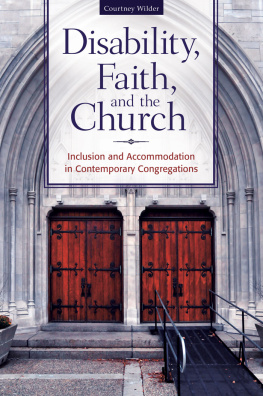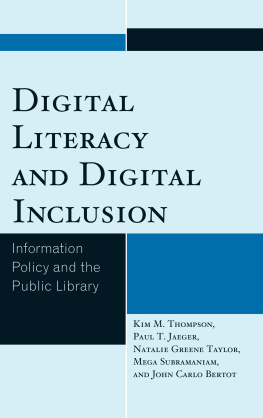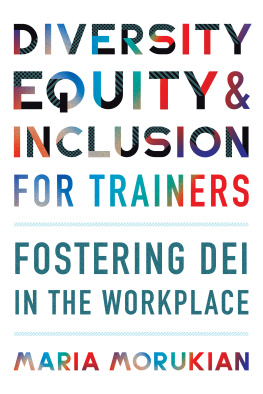Thank you for buying this ebook, published by NYU Press.
Sign up for our e-newsletters to receive information about forthcoming books, special discounts, and more!
Sign Up!
About NYU Press
A publisher of original scholarship since its founding in 1916, New York University Press Produces more than 100 new books each year, with a backlist of 3,000 titles in print. Working across the humanities and social sciences, NYU Press has award-winning lists in sociology, law, cultural and American studies, religion, American history, anthropology, politics, criminology, media and communication, literary studies, and psychology.
People at Work
People at Work
Life, Power, and Social Inclusion in the New Economy
EDITED BY
Marjorie L. DeVault

NEW YORK UNIVERSITY PRESS
New York and London
www.nyupress.org
2008 by New York University
All rights reserved
Library of Congress Cataloging-in-Publication Data
People at work : life, power, and social inclusion in the new economy/
edited by Marjorie L. DeVault.
p. cm. Includes bibliographical references and index.
ISBN 9780814720035 (cloth : alk. paper)
ISBN 9780814720042 (pbk. : alk. paper)
1. WorkSocial aspects. 2. Industrial sociology.
I. DeVault, Marjorie L., 1950
HD6955.P464 2008
306.36dc22 2007038650
New York University Press books are printed on acid-free paper,
and their binding materials are chosen for strength and durability.
Manufactured in the United States of America
c 10 9 8 7 6 5 4 3 2 1
p 10 9 8 7 6 5 4 3 2 1
Contents
Marjorie L. DeVault
1 Hell on My Face:
The Production of Workplace Il-literacy
Nancy Jackson and Bonnie Slade
2 Institutional Technologies:
Coordinating Families and Schools, Bodies and Texts
Alison I. Griffith and Lois Andr-Bechely
3 The Promises and Realities
of U.S. Microenterprise Development
Nancy C. Jurik
4 Work, Disability, and Social Inclusion:
The Promise and Problematics of EU Disability Policy
Rannveig Traustadttir
Payal Banerjee
Nancy A. Naples
Brenda Solomon
Ellen K. Scott and Andrew S. London
Catherine Richards Solomon
10 Use What You Have, Be Thankful You Have It: Work and the Promise of Social
Inclusion for Students with Disabilities
Katrina Arndt
Frank Ridzi
Yvette Daniel
13 (Dis)continuity of Care:
Explicating the Ruling Relations of Home Support
Marie Campbell
Marjorie L. DeVault
Acknowledgments
This book grew from a conference at Syracuse University, in February 2004, that was made possible by a grant from the American Sociological Associations Fund for the Advancement of the Discipline, which is supported in part by the National Science Foundation and skillfully administered at ASA by Roberta Spalter-Roth. We received additional funding for the conference from Syracuse Universitys Department of Sociology, Maxwell School of Citizenship and Public Affairs, Social Science Program, Moynihan Institute of Global Affairs, and Senate Committee on LGBT Concerns. The conference gave us time for sustained collaborative discussion directed toward developing insights about the broad sweep and common technologies of economic restructuring in the diverse locations we were investigating.
Im sure that our intellectual indebtedness to Dorothy E. Smith is evident throughout the text, but I am pleased to thank her again here for her generosity and for the intellectual engagement that has inspired me to pursue these issues. She told me years ago that she didnt have all the answers (as I seemed to believe) and that I should work out my own adaptations of her approach. I have enjoyed that project and tried to work in ways that are faithful to her vision, but of course I am responsible for the ways in which my implementation of the approach falls short. Dorothy and Joan Acker were inspiring plenary speakers at our conference, and I thank both of them for giving us leadership there; Im also grateful to other conference attendees who contributed to our thinking, and to James Biddle for videotaping the proceedings.
Ive learned a great deal from each contributor to this book and I thank them all for their participation in the project. Marie Campbell deserves particular mention for the enormously helpful comments she provided as I prepared the editorial material for the book. My partner, Robert Chibka, has been, as always, an insightful critic and loyal supporter. And, finally, I wish to thank our editor, Ilene Kalish, who is smart, efficient, and fun to work with, as well as the other staff at New York University Press who have made the production of this book a smooth and enjoyable endeavor.
Introduction
As I travel from my teaching job in Syracuse, New York, to my home in Boston, Massachusetts, I rub shoulders with other professionals and business travelers moving through the airportoften connected to work via cell phone and laptop. As I pass through airport security, I encounter teams of workers doing x-ray screeningusually middle-aged white workers in Syracuse, but not in Boston, where the team turned predominantly white after September 11, 2001, but since then has gradually become more ethnically mixed again. I buy food in the Syracuse airport from white women and in Boston from Asian and Caribbean immigrants, marked by their appearance and speech. Like other North Americans, I am increasingly aware that my everyday life is shaped by events and activities far removed from my workplace and home. I think of the jobs lost in factory closings since I came to Syracuse in the 1980s and of the low-wage service jobs in shopping malls that have replaced them; of the high-tech workers who lost jobs as their bubble burst; of immigrant health-care workers in long-term-care facilities; and of those in other parts of the world who make so many of my clothes or speak to me on the phone when I need help with my computer. Sitting in the airportgrading papers, waiting to get homeI hear the news on the TV monitor hanging overhead: the commentators assure us that the economy looks good. Thats one account of things, but I know that there are many stories to tell about work and life in a world undergoing fundamental transformation.
In the accounting categories of employers and states, the people I encounter in my travels may be categorized as full- or part-time employees and their salaries or wages tallied as part of the cost of labor. They may be U.S. citizens, with all the associated rights, or part of the growing pool of immigrant labor, with or without legal permission to work. And some of their activities may be understood and accounted for as part of the nations productivity, while other work they do falls out of that picture. Such descriptive labels point to the categories through which work and social policy are administered in the U.S. and other Western nations. Like any representation (including my earlier narrative description), each of these accounting categories captures some elements of the lives they refer to and leaves out many more.
The people behind these textual sketches live varied, embodied lives, with different capacities that change over time; their activities braid together paid work and relations with others, of mutual responsibility, care, and dependence. Our goal in this book is to examine the ways that these and other peoples lives are represented in the textual machinery of a changing world and to explore the consequences of those representations. We offer a mode of analysisinstitutional ethnography (Smith 1987, 2005)designed for exploring a regime of social policy from the standpoint of those subject to it. We strive to keep both lives and texts in view.
Next page








